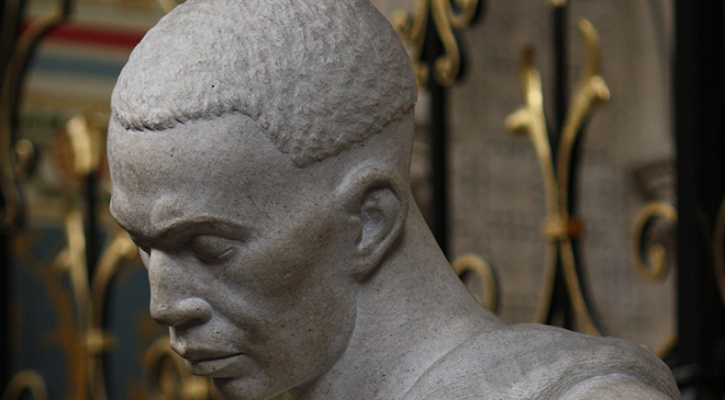San Martino de Porres, Saint of the day for November 3

Saint of the day for November 3
(9 December 1579 - 3 November 1639)
The history of San Martino de Porres
“Unknown father” is the cold legal phrase used sometimes in baptismal records. "Half-blood" or "war souvenir" is the cruel name inflicted by those of "pure" blood. Like many others, Martin could have become a bitter man, but he didn't. It was said that as a child he gave his heart and goods to the poor and despised.
He was the son of a liberated woman from Panama, probably black but possibly also of indigenous descent, and a Spanish noble from Lima, Peru. His parents never married. Martin inherited his mother's dark features and complexion. This annoyed his father, who finally recognized his son after eight years. After the birth of a sister, the father abandoned the family. Martin was raised in poverty, locked up in a low-level society in Lima.
When he was 12, his mother hired him from a barber-surgeon. Martin learned to cut hair and also to draw blood - standard medical treatment at the time - to heal wounds, prepare and administer medicines.
After a few years in this medical apostolate, Martin turned to the Dominicans to be a “lay helper”, not feeling worthy of being a religious brother. After nine years, the example of his prayer and penance, charity and humility, led the community to ask him to make full religious profession. Many of his nights were spent in prayer and penitential practices; his days were occupied with caring for the sick and caring for the poor. It was particularly impressive that he treated all people regardless of their color, race or status. He was instrumental in the founding of an orphanage, took care of the slaves brought from Africa and managed the priory's daily alms with practicality, as well as generosity. He became procurator for both the priory and the city, whether it was “blankets, shirts, candles, candies, miracles or prayers! “When his priory was in debt, he said,“ I'm just a poor mulatto. Sell me. They are owned by the order. Sell me. "
Alongside his daily work in the kitchen, laundry and infirmary, Martin's life reflected God's extraordinary gifts: ecstasy that lifted him into the air, light that filled the room where he prayed, bi-location, miraculous knowledge, instant healing and a relationship remarkable with animals. His charity extended to the beasts of the fields and even the pests of the kitchen. He excused the raids of mice and rats on the grounds that they were undernourished; he kept stray dogs and cats at his sister's house.
Martin became a terrific fundraiser, getting thousands of dollars in dowry for poor girls so they could marry or enter a convent.
Many of his brethren took Martin as their spiritual director, but he continued to call himself a "poor slave". He was a good friend of another Dominican saint from Peru, Rosa da Lima.
Reflection
Racism is a sin that hardly anyone confesses. Like pollution, it is a "sin of the world" which is everyone's responsibility but apparently no one's fault. One could hardly imagine a more appropriate patron of Christian forgiveness - by those who are discriminated against - and Christian justice - by reformed racists - than Martin de Porres.